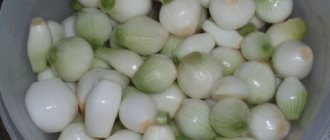Cooking your favorite dishes can be ruined by one ingredient - onions. During its cutting, a whole range of sensations can occur: from a slight burning sensation in the eyes to severe pain. It is possible to avoid unpleasant sensations, experts say. At the same time, breeders are inventing onions without tears.
What causes the burning sensation?
The Federal Agency for Agriculture and Food (BLE) reports that onions contain a large amount of useful substances, such as potassium, vitamin C, B vitamins and others. In addition, onions are rich in so-called mustard oils, or sulfur compounds.
When cutting onions, the substances break down and gaseous propanethiol oxide is released. This substance, according to ophthalmologists, will reach human skin through splashes and onto the nasal mucosa through fumes, causing a burning sensation in the eyes.
“This causes an increased flow of tears, but does not lead to irreversible damage,” Ludger Wallring, a doctor at the German Ophthalmological Association (BVA), explained to RND.
In fact, such released essential oils are beneficial for the human body. According to agricultural engineer Andrea Schneider (Fachverband Deutsche Speisezwiebel e. V.), onions act as a natural antibiotic, improve appetite and digestion, stabilize blood sugar levels, and the unpleasant sensation of burning in the eyes can be avoided using simple techniques.
What you need to know before chopping onions
When cutting a vegetable into pieces, the small cells that make up the scaly layers are destroyed. In this case, sulfur-containing substances immediately leave the cells. When interacting with oxygen, a reaction begins, resulting in the appearance of volatile stable compounds.
The latter, flying around the room, penetrate the mucous membrane of the eye and are converted into sulfuric acid. You can cut onions into strips, circles or other shapes without shedding tears by first neutralizing volatile compounds at the stage of their formation.
For these purposes, it is recommended to use the following rules:
- It is necessary to use only sharply sharpened knives. If the blade is very sharp, few onion cells are destroyed. As a result, the volume of compounds formed will be insignificant.
- The rate of spread of volatile compounds depends on their temperature. In order for the substances to go into dormant mode, it is advisable to keep the vegetable in the refrigerator compartment before slicing.
- For sulfuric acid to appear, volatile compounds require liquid, so it is recommended to provide them with moisture to eliminate the ability to fly around the room with air masses. To do this, simply moisten the cutting board and constantly dip the knife into the cool liquid. Before shredding, the peeled onion must be immersed in a bowl of cool water for a few minutes.
Each onion is considered a sphere that contains a large number of layers. In the middle there are several vegetative buds, which are called the nucleus. The bulbous layers, together with the vegetative buds, are firmly fixed to the base. In the upper region of the vegetable, these spherical layers are not attached to anything.
Before cutting the rhizome, the layers of the onion are one. In this regard, most cooks cut off the base at the very end, since in this form the product will not fall apart during the shredding stage.
When working with heavy and sharp kitchen knives, there is a risk of injuring your fingers. The sharper the blade is, the deeper the cut can be made. If you have no experience working with professional knives, it is not advisable to conduct experiments.
Precautionary measures:
- Beginner cooks are advised to use a sharp, small knife with a thin blade.
- During the work phase, it is imperative to hold your fingers correctly. To do this, just look at how experienced specialists fix their hands when slicing food.
- The first phalanges should be slightly pressed, the second should be placed perpendicular to the surface of the tabletop. The knife, which is held in the other hand, must be moved exclusively perpendicular to the table surface, without minimal deviation to the side.
If you hold your hands correctly, your fingers will never get cuts.
How not to cry?
Experts recommend cutting onions with a very sharp knife. This will minimize damage to the bulb structure and the release of sulfur compounds that irritate the eyes.
It is better to peel the onions under running water to prevent your eyes from watering so much. Safety glasses help protect your eyes from splashes of onion juice, but unfortunately not from fumes.
“It’s also a good idea to briefly rinse all utensils with water before slicing,” experts recommend.
There is no need to lean very low to the table when chopping onions. The greater the distance from it, the easier the evaporation. For some, a hood helps get rid of them.
If the burning sensation is very strong and nothing helps, you can freeze the onion before chopping or use a food processor, which will take care of the unpleasant process.
Reviews
Housewives deal with tearing while cutting onions in different ways..
Irina, 27 years old : “I’m sharing a great way to cut onions without tears. You will need a hood, the bow itself and a board with a knife. Turn the hood on high, place a cutting board directly underneath it on the stove, and start cutting. Beauty!".
Ekaterina, 43 years old : “It’s very simple: peel the onion, cut it in half under running cold water (if the onion is vigorous or large, then into 4 parts) and put it in the freezer for 3-5 minutes. That's all! I’ve long forgotten the last time I cried from an onion.”
Tasha, 30 years old : “I read online that you need to put a lit candle next to the board. I checked it, it works! You can peel tons of onions this way – no tears! I hope someone finds this advice useful.”
Causes of tears
The mechanics and chemistry of tear production when cutting an onion are simple. A knife, cutting the onion, violates its cellular integrity, as a result of which the volatile sulfur compounds contained in the cells soar into the air and are transferred to the mucous membrane of the eyes. In the process of contact with tear fluid, sulfur compounds are converted into weakly concentrated sulfuric acid, which, irritating the ocular mucous membrane, causes profuse lacrimation.
Onion tears or why onions cry
What are tears and where do they come from? We rarely think about such superficial and at the same time deep questions. From school we know that tears are the body’s protective reaction to an aggressive environment. Tears may appear due to dust, strong wind, or any eye infection. They can be a reaction to anger, a manifestation of resentment, despair and even happiness. But sometimes tears can be such an obvious thing that we simply don't take them seriously. However, at least once in everyone’s life, the question has come to everyone’s mind about why we cry from onions.
How to Preserve Chopped Onions
The onion is best stored whole, in a ventilated and cool place. To do this, vegetables are woven into a long braid and kept suspended. The product can also be stored in sliced form. However, the shelf life will not be as long as that of whole onions. Sliced onions can be kept in the refrigerator compartment for 7-10 days. To chop large quantities of vegetables, you must use a clean knife and a dry cutting board.
Before sending onion slices to the refrigerator compartment, you need to prepare:
- if the cutting is large, parts of the onion can be wrapped in cling film;
- place in a small plastic bag that has a sealable zipper;
- transfer to a plastic container intended for food products and cover with a lid so that the vegetable does not rot and dry out, and does not transfer the smell to other products.
For storage, it is recommended to take a vegetable drawer or the bottom shelf in the refrigerator compartment. If spots begin to appear on the vegetable or there is an unpleasant odor, the cuttings must be thrown away.
Onion cutting equipment
If you cannot cut the vegetable beautifully by hand, you can use a special device for chopping onions.
The following types of devices for cutting vegetables are distinguished:
| Inventory | Features of work |
| Vegetable holder | Represented by a pointed comb. It is a budget model. To cut, just stick sharpened stakes into one of the onion halves, then you can walk between them with a knife. As a result, the product will be cut into equal half rings. This holder is also suitable for chopping into cubes. |
| Mandolin grater | Made from very durable steel, which retains its sharpness over a long period of time. The device is made of safe plastic. Suitable for cutting any vegetables, as well as cabbage. The grater has a practical protective handle that reliably protects your fingers from cuts. The set also includes a holder not only for onions, but also for other vegetables. |
What are some home remedies for onion tears?
Although onions can be a tear stimulant, they are merely irritating and not harmful to the eyes.
However, you want to quickly soothe irritated, burning eyes to eliminate redness and reduce discomfort. Here are some tips to reduce crying from onion irritation:
- Place a distance or barrier between you and the raw onion you are cutting. Place chopped onions under glass or extend your work space.
- Rinse your eyes with cool, clean water.
- Apply a cool compress or cool cucumbers to your eyes to reduce irritation.
- Use eye drops to rinse your eyes.
- Try other remedies for eye pain, such as cotton balls soaked in aloe vera gel and water or sterile castor oil eye drops.
Features of the use of onions in cooking
Onions are one of the most common and sought-after vegetables, without which it is difficult to imagine world cooking. It has a universal range of applications and can be used for preparing appetizers, first and second courses, baked goods and even desserts.
The described vegetable has a number of beneficial properties, which are due to its rich chemical composition, represented by: essential oils, vitamins A, E and group B, ascorbic acid, mineral salts, antioxidants, organic acids, flavonoids, fiber. Thanks to such a multifaceted composition, the root vegetable has antibacterial, wound-healing, restorative, sedative, antiseptic, tonic and stimulating effects.
Can you develop an immunity to chopping onions that make you cry?
I just chopped a particularly strong onion, I noticed a little irritation, but no tears. Then I realized that onions hadn't made me cry in years, even decades. I use all types of onions and don't take special precautions to prevent tears. I don't freeze them or core them or use glasses or light a candle or anything like that. Of course, I got better (faster) over the years, but I remember hating chopping onions when I was younger because of the irritation to my eyes. It doesn't seem like speed alone can account for the difference in my reaction.
Can I attribute this to a similar phenomenon that gives me asbestos fingers and my tolerance to extremely hot (spicy) foods?
Considering that the tear-inducing effect of onions is due to a direct chemical process, it is unlikely that you will develop any actual immunity in terms of the effect. Scientific American describes it:
Peeling, cutting, or crushing the onion tissue releases enzymes called allinases, which convert these molecules into sulfenic acids. Sulfenic acids, in turn, spontaneously rearrange to form syn-propanethial-S-oxide, a chemical that causes tears. They also condense to form odorous thiosulfinates, simultaneously causing the pungent odor associated with onion chopping and leading to the false accusation that the odor is what causes the itchy eye. By the way, sulfenic acid in garlic takes a different chemical route, sparing the eyes. The formation of syn-propanethial-S-oxide peaks occurs approximately 30 seconds after mechanical damage to the onion and completes its chemical evolution cycle within approximately five minutes.
[. ] Free nerve endings [on the cornea] detect syn-propanethial-S-oxide on the cornea and stimulate activity in the ciliary nerve—which the central nervous system interprets as a burning sensation—proportional to the compound concentration. This neural activity reflexively activates autonomic fibers, which then transmit a signal back to the eye, telling the lacrimal glands to flush out the irritant.
It turns out that newer science indicates that the conversion does not occur spontaneously, but is due to an enzyme for this purpose, now called tear factor synthase.
What is likely, especially for an experienced cook:
- Improved knife skills and speed, reducing the amount of time in close contact with irritating gases produced while chopping onions
- Increased tolerance to specific sensations
Yes you can. Apparently workers in factories that process large quantities of onions do not have any problems:
At the factory they say that you got used to cutting onions and after a few minutes you stopped crying.
I don't know how old you are, but the most likely explanation is simply biological changes. Thermoreceptors in the human body, most noticeably in the hands and feet, become less sensitive as we age, or in other words, the threshold at which we experience these sensations is much higher, and it is a continuous process as we grow and mature. For example, there's a hint here - the reason you're advised to test your baby's bath water with your elbow, even if you're in your twenties, is because baby's receptors are on high alert and skin is much more vulnerable than old skin, so your Hands at 25 years old will not get very hot when the child has a will. There is a complex scientific explanation for nerve fibers, but I won't go into detail. I'
As for the lack of tears - I don't cry with onions anymore, although I still feel the burning sensation. The reason I don't do this is because I have something called Sjogrens and now I can rarely actually bring tears to my eyes, no matter how strongly I feel it. I doubt this is the explanation for you, otherwise your tongue would be too sore to tolerate hot, spicy foods, but there are other conditions that cause less fluid to flow into the tear ducts, which again is associated with aging , so your eye may firstly be less sensitive due to changes in the nerve fibers, and secondly, the tear response is not as easily activated even if an irritating stimulus is detected.
Not much fun, I know, and further proof that the obsolescence factor is built into .
I noticed that the third time I was exposed to tear gas at boot camp, I became less sensitive. The next time I chopped onions, it didn't bother me at all. I'm also not in agony if I get jalapeño juice in my eyes. So I would say that I learned somehow, whether it really applies to others, I don't know. No one else in boot camp was anything other than extremely vulnerable to tear gas, so they weren't bad batches.
Besides biological changes (as other authors have said), I strongly suspect another factor:
Your improved equipment and technology.
- With sharper knives (-> less broken cells, less tear gas)
- and faster operation (-> shorter dwell time)
- You've gained confidence and aren't tempted to watch yourself work the same way you probably would as a beginner: instead of leaning over a cutting board, you work in front of you. (And therefore less susceptible to vapor formation.)
I've watched this work with my kids in the kitchen: they'll look closely and from above - hey, those knives are sharp and close to their fingers! - and tear it apart. When I got them to work in front of them, we had a lot less problems. My five-year-old can now cut onions without crying—as long as she remembers to keep her hands away from her face.
The best way to gain "immunity" is to use an extremely sharp knife. I've probably chopped 3,000 onions in the last few years, and only twice have I even lightly chopped, and that's when I cooked for my mothers with terrible knives. Also, never use a serrated knife with a bow.
Chemical composition of bulbs
It was not without reason that ancient scientists considered onions to be valuable medicinal raw materials. The juicy pulp of onions contains a number of useful vitamins and minerals .
| Biologically active nutrient | Amount per 100 g of fresh onion pulp | |
| Vitamin E | 0.2 mg | 1% |
| Vitamin C | 10 mg | 11% |
| Vitamin B1 | 0.05 mg | 3% |
| Vitamin B2 | 0.02 mg | 1% |
| Vitamin B5 | 0.1 mg | 2% |
| Vitamin B6 | 0.12 mg | 6% |
| Vitamins N | 0.9 mcg | 2% |
| Vitamin PP | 0.7 mg | 4% |
| Vitamin B9 | 9 mcg | 2% |
| Potassium | 175 mg | 7% |
| Calcium | 31 mg | 3% |
| Magnesium | 14 mg | 4% |
| Sodium | 4 mg | 0% |
| Sulfur | 65 mg | — |
| Phosphorus | 58 mg | 7% |
| Chlorine | 25 mg | 1% |
| Bor | 200 mcg | — |
| Iron | 0.8 mg | 4% |
| Iodine | 3 mcg | 2% |
| Cobalt | 5 mcg | 50% |
| Manganese | 0.23 mg | 12% |
| Copper | 0.09 mg | 9% |
| Fluorine | 31 mcg | 1% |
| Chromium | 2 mcg | 4% |
| Zinc | 0.85 mg | 7% |
In addition to biologically active components, onion pulp contains 3 g of dietary fiber, 8.2 g of carbohydrates, 0.2 g of fat and 1.4 g of protein.











